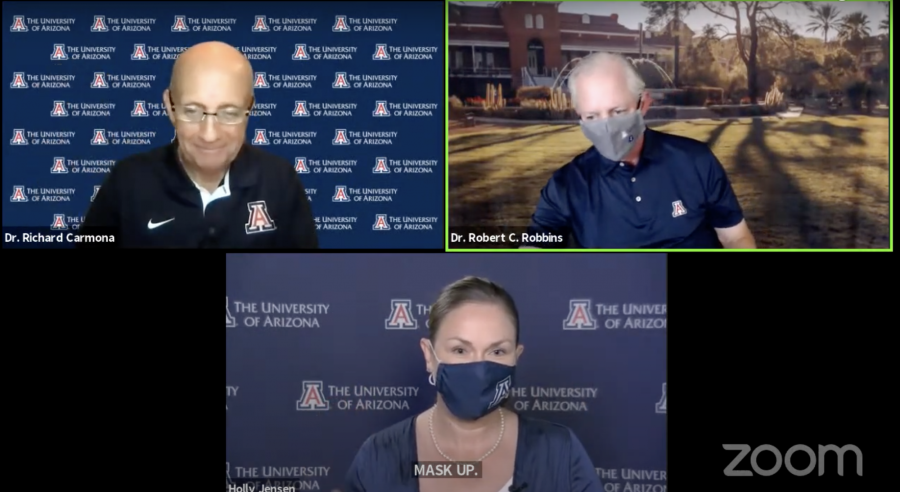The University of Arizona’s COVID-19 reentry task force met virtually on Monday, Aug. 9, for their first meeting leading into the 2021-22 school year. The group, consisting of university President Dr. Robert C. Robbins, Vice President of Communications Holly Jensen and 17th surgeon general and professor Dr. Richard Carmona, met to discuss both their concerns regarding the Delta variant of COVID-19 and their plans for the upcoming fall semester.
Robbins began by stating that the university will begin the fall 2021 semester with all campus-based courses fully in-person. However, he proceeded to outline how nationwide rises in the highly contagious delta variant strain of COVID-19 will complicate this transition. Ultimately, Robbins was optimistic that mitigation strategies previously found to be effective at the university would continue to prove useful in minimizing the spread of the Delta variant on campus.
These strategies include wearing masks, ventilation upgrades via newly installed filters, quick reliable testing — and as Robbins emphasized most importantly — vaccination. According to Carmona, 43% of students have uploaded their vaccination information. However, in the wake of increased transmissibility of the delta variant, Robbins suggested at least 80-90% of the university population should be vaccinated in order to achieve herd immunity. Both Robbins and Carmona urged the campus community to get vaccinated if they have not already.
“The real key is going to be to get as many people as possible vaccinated,” Robbins said.
Robbins also described that the vaccine lowers the risk of getting the virus in addition to protecting the community, and — if a vaccinated person does get infected — lowers the severity of symptoms. At this time, students and university employees can receive the Pfizer vaccine at Campus Health.
Regarding mask-wearing, Robbins urged all individuals, regardless of vaccination status, to wear a mask indoors on campus. In most spaces on campus, mask use is strongly encouraged. However, masks are required in healthcare facilities and laboratories as permitted by state law. Classrooms will be equipped with supplies of masks available for student use.
“We are strongly encouraging masks in our indoor spaces, particularly in our classrooms and laboratories … . I expect everyone to cover their face when they’re indoors,” Robbins said.
COVID-19 rapid antigen tests will be available by appointment at the Catalina Room in the Student Union Memorial Center for use by asymptomatic students. Robbins recommended weekly testing for both vaccinated and unvaccinated students. He also encouraged the larger university community to monitor for symptoms, noting that breakthrough infections in the vaccinated populations may have symptoms that resemble that of the common cold in contrast to the flu-like symptoms typically associated with COVID-19.
Wastewater testing and trace policies will also continue. Similar to the policy last year, a quarantine dorm will be used to house students who tested positive for COVID-19 with 150 beds set aside, as well as additional beds sufficient to accommodate several hundred students, according to Carmona.
Robbins also expressed frustration with divisiveness regarding mask-wearing and vaccination, which remain controversial political topics at both the state and national levels.
“It is very disheartening to see vaccinations and face coverings as topics of controversy,” Robbins said. “While they are indeed choices we make as individuals, I want us to remember that these are not choices we are making only for ourselves.”
During the question and answer portion of the meeting, representatives from local media raised concerns as to how these mitigation strategies will be effectively enforced considering Arizona law banning schools from requiring vaccines or masks.
“The ideal would be that we could require everyone to be vaccinated. We could require everyone to cover their face. We could require many things that other places are doing but we cannot do here because of state law,” Robbins said.
Robbins proceeded to emphasize that they are strongly encouraging compliance with mask wearing and vaccination — though these measures cannot be required at this time. He stated that the university is collaborating with the board of regents, the governor, Northern Arizona University and Arizona State University in order to find the best ways to keep Arizona campuses safe.
One question raised was whether the university intends to challenge the state law, similar to certain K-12 schools both in Arizona and in other states with similar restrictions.
“I don’t think that we as the university plan to challenge the state law. There are others who are going to do that. I know some of the K-12 school districts have instituted mask mandates, and I think we just wait to see how that plays out,” Robbins said.
Robbins also stated that the university is seeking out more clarification about what it can do in the case of an outbreak, as well as how to clearly define what situations constitute an outbreak — or a turning point demanding more drastic action.
In concluding the meeting, Robbins emphasized that the current situation is dynamic and susceptible to change as the start of fall semester approaches.
“We will make adjustments as we need to depending on the number of cases that appear,” Robbins said.
The task force will meet again next Monday, Aug.16, at 11 a.m. to continue to track the spread of the Delta variant and its effect on the fall 2021 semester.
Follow Hillary Schiff on Twitter









